climatechange
Latest
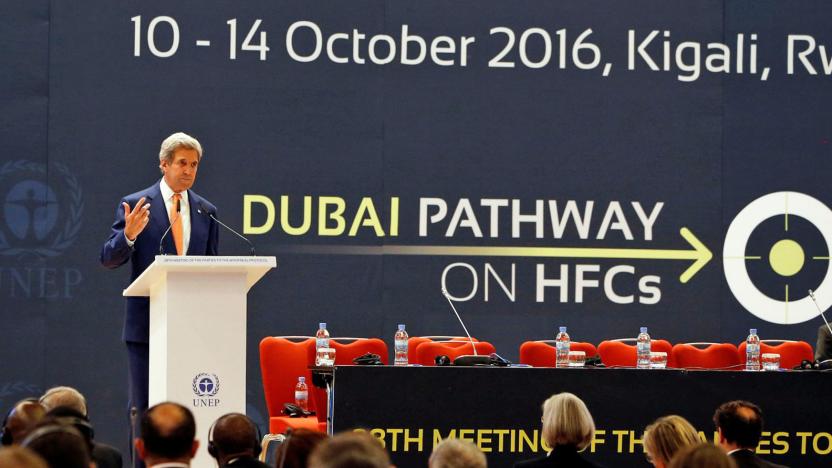
Kigali Amendment reached to cut use of planet-warming HFCs
Today, more than 170 nations have settled on a plan to cut the use of hydrofluorocarbons (or HFCs), a refrigerant that causes warming in the Earth's atmosphere. Called the Kigali Amendment for the location of negotiations in Rwanda, it's the result of seven years of work to expand the Montreal Protocol reached in 1987. That deal phased out the use of ozone-depleting chemicals, and by adding to it, this agreement carries its legally binding weight as a treaty, without needing to wait for ratification like last year's Paris Agreement.

Earth's CO2 levels have permanently crossed the 400ppm threshold
Despite the fact that September is typically the lowest month for atmospheric carbon dioxide, the CO2 levels in Earth's atmosphere crossed the symbolic 400 parts per million threshold this month. According to climate scientists, it is extremely unlikely that the planet will ever drop below those levels again in our lifetimes.
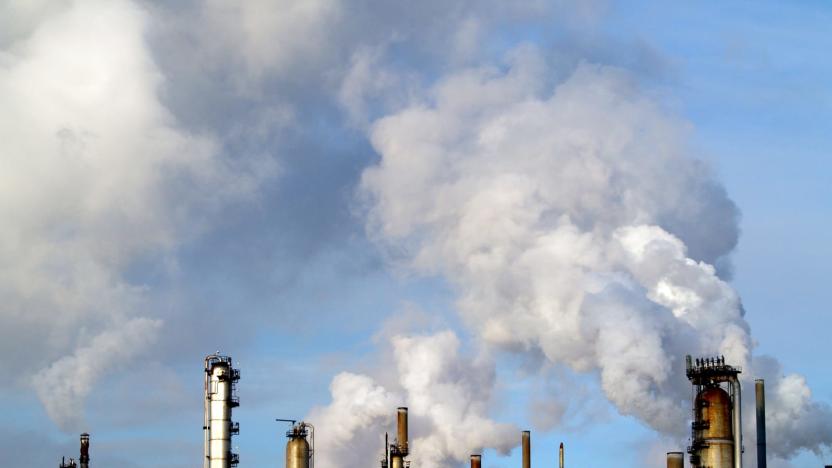
Canada will impose a carbon price to fight climate change
Canada will impose a minimum price on carbon emissions, says the country's environment minister Catherine McKenna. The move is designed to push the nation's 10 provinces into properly regulating climate change-causing gases. Reuters reports that McKenna said so on CTV's Question Period, and that more details would be released before the end of October.
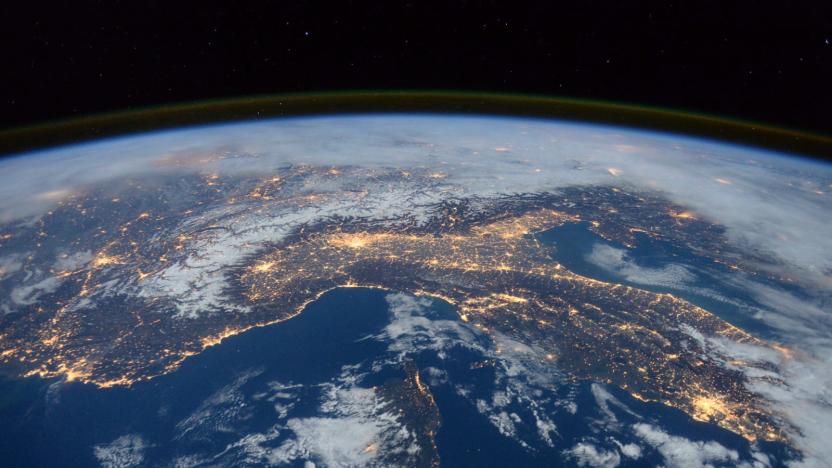
Americans divided on how much to spend to battle climate change
It's going to take a lot of money (among many other things) to help combat climate change, and one of the challenges there has been getting citizens to pay for it. But a new survey from Energy Policy Institute at the University of Chicago and The Associated Press-NORC Center for Public Affairs Research indicates some Americans may be warming to the idea. While the data gathered shows that a whopping 42 percent of people wouldn't even pay $1 a month on their energy bill to reduce greenhouse gas emissions, those who were willing to pay might put up some decent cash.

Sun-powered bacteria turn nasty CO2 into helpful biofuel
Cars emit polluting carbon dioxide (CO2) when they burn gas, but what if you could reverse the process? Scientists from the University of Washington have engineered a bacteria that can do just that: pull CO2 from the air and, using sunlight, convert it to methane and hydrogen gas. The organism only produces a limited amount of fuel, but the results could lead to ways to reduce CO2 in the air and produce useful fuel at the same time.

ICYMI: Robot tattoo artist and healing coral reefs
try{document.getElementById("aol-cms-player-1").style.display="none";}catch(e){}Today on In Case You Missed It: Scientists were able to program soft materials to shift their shape on digital command, which is only a precursor to our biggest tech news of this episode: That an industrial robot normally used to put together cars was repurposed to delicately give tattoos to human beings. Considering the robotic arm is large and heavy enough to lift car doors easily, we'd like to invite you all to give this tattoo artist a try first, please.

NASA maps the thawed parts of the Greenland ice sheet
NASA has created the first map of the bottom of the Greenland ice sheet, showing which parts have begun thawing and which remain frozen as ever. This is the first time what's underneath the surface of the massive block of ice has been mapped, because the only access scientists have to it is a few bore holes. They've been trying to find out what's going on underneath for a long time, since it's essential for predicting the sheet's movements in the future. "If the ice at its bottom is at the melting point temperature, or thawed," said NASA Goddard glaciologist and team leader Joe MacGregor, "then there could be enough liquid water there for the ice to flow faster and affect how quickly it responds to climate change."
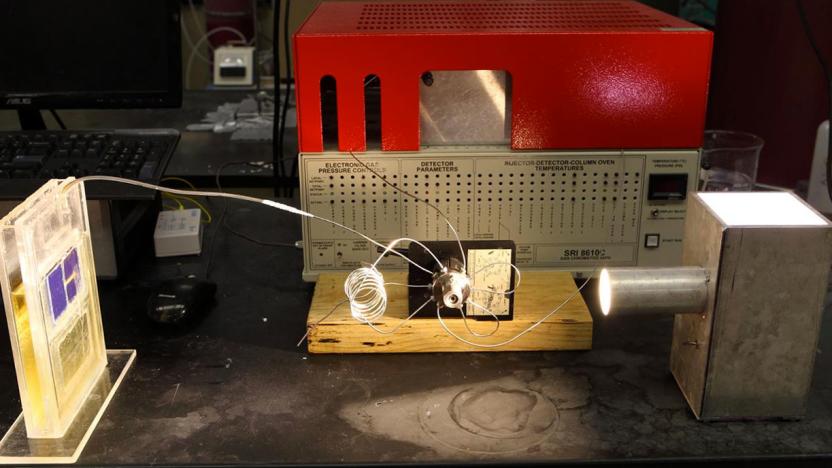
Scientists turn CO2 into fuel with solar power
Researchers at the University of Illinois at Chicago believe that they've perfected the art of photosynthetic solar cells. It's a technology that mimics a plant's ability to inhale carbon dioxide and, with water, convert it into glucose and oxygen. This system is capable of drawing in carbon dioxide and processing it into a synthetic fuel that could be used to power vehicles. Theoretically, this device could create a virtuous cycle where climate-altering carbon could be removed from the atmosphere and pumped back into cars.

ICYMI: Eye exams go DIY and smartfeeding your pets
try{document.getElementById("aol-cms-player-1").style.display="none";}catch(e){}Today on In Case You Missed It: A new device can calculate people's eyeglass prescriptions without needing to see an optometrist, though whether that's actually responsible or not is up to you. Meanwhile a cloud-connected smart petfeeder that suffered from downed servers had to send a notice to owners to feed their pets manually, since the machines lost all connection and didn't release food. There's a lot to talk about this week but we recommend reading up on NOAA's three month weather outlook, since everyone will be talking about the DNC this weekend anyway. As always, please share any interesting tech or science videos you find by using the #ICYMI hashtag on Twitter for @mskerryd.

Democrats ask for immediate action to combat climate change
The Democrats and Republicans differ on many fronts, but the contrast is particularly striking when it comes to climate change. The Republican party platform dismisses it and its presidential candidate calls it a "hoax." But on Monday night as the 2016 Democratic National Convention began, multiple speakers including Senators Bernie Sanders (D, VT) and Elizabeth Warren (D, MA) touched on the need to directly address the issue. Similarly, the party's 2016 platform document spends many pages touching upon climate change, calling it an "urgent threat and a defining challenge of our time.

EPA findings should lead to caps on aircraft emissions
It's no secret that aircraft contribute to harmful emissions like road-going vehicles, and the Environmental Protection Agency is one step closer to keeping that pollution in check. It recently finalized findings showing that some aircraft produce air pollution that contributes directly to climate change. As a result, the EPA is now free to set standards for aircraft emissions that help the US honor the Clean Air Act and, ultimately, its commitment to the Paris climate change agreement. While the US is already backing an international standard, this gives it the chance to demand tougher (or at least, more America-specific) requirements.
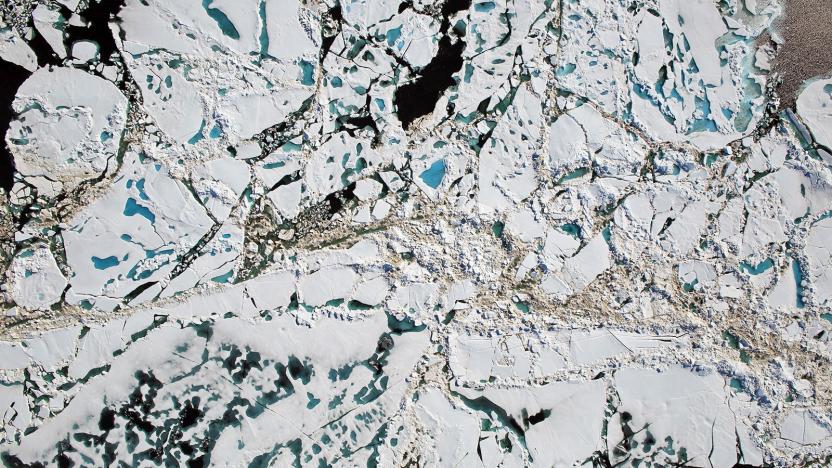
June marked 14 straight months of record high temperatures
Thanks to the ocean warming effects of El Niño and the global warming effects of humans in general, planet Earth just experienced its warmest June on record, the National Oceanic and Atmospheric Administration reports today. The extremely warm June marks 14 straight months of record-breaking warmth, and the longest hot streak on record.

Climate change is pushing clouds up and toward the poles
For the first time, researchers have found evidence that global warming caused by humans is affecting clouds -- and not in a good way. A study by team from the Scripps Institution of Oceanography shows that clouds are being pushed up and out of mid-range latitudes toward the poles. "It's really the first credible evidence that we have of climate change and clouds in the observed record ," says Scripps atmospheric scientists Joel Norris. The cloud shift could push temperatures even higher than predicted, and also shows the need to improve atmospheric measurements.
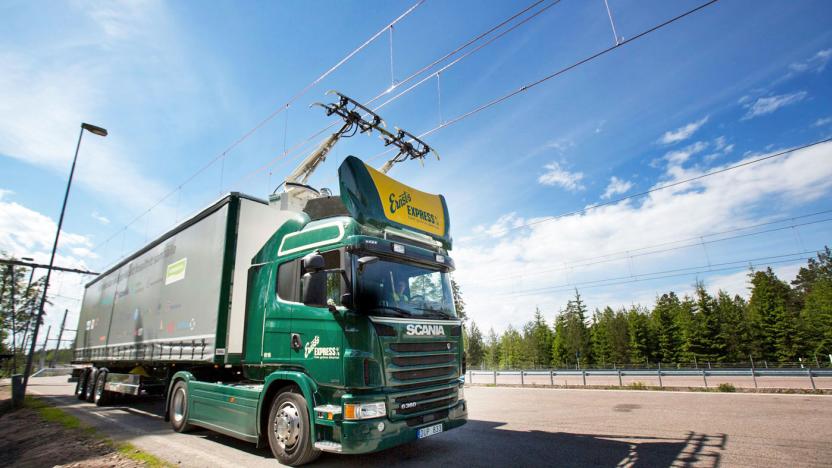
Sweden debuts the world's first 'electric highway'
Fossil fuels are bad for the planet, and freight haulage is one of the more carbon-intensive activities that operate today. That's why Siemens and Scania have teamed up to trial what's being called the world's first "electric highway." Much like an electrified railroad, the 1.2 mile stretch has a series of wires hanging overhead that a pantograph-equipped truck can connect to. Then, the vehicle can deactivate its fuel-burning engine and coast along on that delicious, dirt-cheap electricity, switching back when the wires stop.

El Niño might push CO2 levels to a symbolic high this year
The amount of CO2 measured atop Hawaii's Mauna Loa volcano could end up reaching a record high throughout 2016 thanks to the recent El Niño weather phenomenon, the BBC reports. According to a study from the UK Met Office, the volcano's recorded CO2 levels could stay above 400 parts per million for the entire year, in part because El Niño has had a drying effect in the tropics. You might remember that the NOAA also announced the highest recorded jump in CO2 levels at Mauna Loa earlier this year -- El Niño is just exacerbating humanity's troubling effect on the environment.

Biggest US coal miner bankrolled anti-climate change groups
The wealthy using its money to suppress (or avenge) inconvenient truths is nothing new, even if nobody thought to use a washed-up pro wrestler for cover until now. But there are far worse things for a one-percenter to do than force Gawker into bankruptcy, such as helping to push the planet towards a preventable ecological crisis. The Guardian has found that Peabody Energy, America's biggest coal mining company, used its cash to bankroll an enormous and diverse group of pro-carbon lobby groups and scientists. The now-bankrupt firm is accused of funding what one source described as "the heart and soul of climate denial."

Mars faced an ice age 400,000 years ago, and it's still recovering
We've known for a while now that Mars has water frozen in ice. And analyzing that water has been a key goal to understanding how the planet has changed over time, especially if its presence meant it once held life. Today, a newly published study concludes that Mars is ever-so slowly exiting an ice age that ended 400,000 years ago.

Study: we can ditch fossil fuels in 10 years, if we want to
The quest to end the use of fossil fuels might not be as daunting as you think. A University of Sussex study claims that humanity could drop coal and oil within a decade, based largely on historical evidence that many tend to overlook. Professor Benjamin Sovacool notes that energy transitions have happened quickly whenever there was a combination of "strong government intervention" with economic or environmental incentives to switch. It only took 11 years for the Canadian province of Ontario to abandon coal energy, for example, while nuclear power surged to 40 percent of France's electricity supply within 12 years. In the case of fossil fuels, it's a combination of climate change worries, dwindling resources and advanced technology that could step up the pace.

Climate change is now affecting how the Earth moves
Researchers at NASA's Jet Propulsion Laboratory have found that climate change is now affecting the way that the Earth moves. The team found that, as the last century has progressed, the "wobble" that our planet makes as it travels has shifted. A hundred years ago this movement -- called polar motion -- was tilted in favor of Canada, but has now moved in the direction of the UK. In an of itself, the shift won't cause any damage, but the fact that climate change is now having this sort of effect should cause everyone to get nervous.

Fungi can help NASA deduce how climate change affects forests
A team from NASA's Jet Propulsion Laboratory has developed a new method to detect what kind of mycorrhizae are attached to the roots of trees using only satellite images. Mycorrhizae are fungi that form mutually beneficial relationships with the roots of trees, increasing the plants' absorption capability and providing them with direct access to sugars. There are two types of mycorrhizae, and each tree/plant species is only associated with either one of them. Since the two respond differently to climate change, scientists can use the method to figure out how forests will fare in the future.








